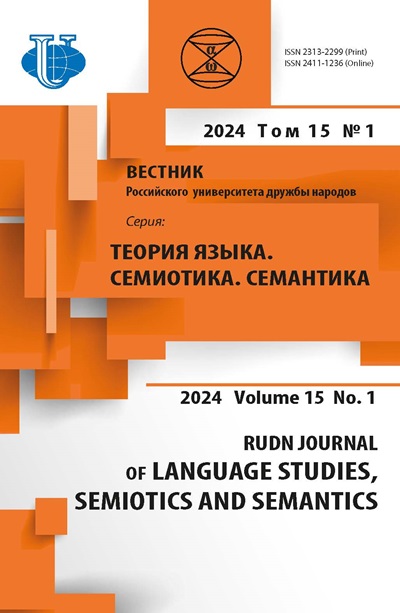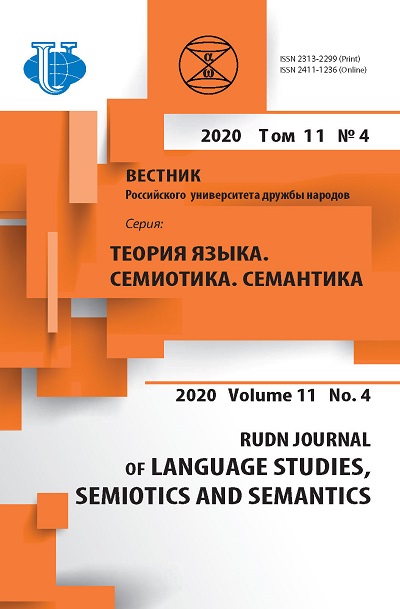Cognitive-Pragmatic Interpretation of Linguistic Personality (on the example of market-economic terminology)
- Authors: Semenova S.N.1, Aksyutenkova L.G.1
-
Affiliations:
- Kuban State University
- Issue: Vol 11, No 4 (2020)
- Pages: 760-774
- Section: Cognitive Research
- URL: https://journals.rudn.ru/semiotics-semantics/article/view/25050
- DOI: https://doi.org/10.22363/2313-2299-2020-11-4-760-774
Cite item
Full Text
Abstract
The article presents a conceptual apparatus of conceptualization on the example of economic cognitive sphere. The relevance of this work can be considered from the point of view of “language of the market” study as an accumulative sphere of fixation of “market-economic” surrounding reality, and a cognitive-pragmatic aspect of human consciousness’ development. The aim was to evaluate the language of market economy from cognitive-derivational position as well as problems connected with the usage of borrowed foreign words. The authors solved the tasks: 1) analyzed and interpreted “language of the market” special vocabulary in English and Russian; 2) understood the scientific and the professional picture of the world through the “economic” language; 3) identified the specific expression of external and internal state of its participants; 4) found out the borrowed foreign words; 5) described the collected information. During the study of the material the authors used: 1) the component analysis method; 2) the continuous sampling method; 3) the analysis of terminological definitions; 4) the classification method. The researchers analyzed the concept, which was the main result and means of linguistic conceptualization of the world and the economic term as a result and means of conceptualization of the economic picture of the world. The main parameters of economic cognitive derivational system and borrowed foreign words spheres were described. A detailed analysis of terminological phrases allowed identifying the most common structural types of functioning in the economic cognitive sphere of composite economic terms and borrowed foreign words. It can be concluded that the study of the market economy language makes it possible to regard its evolution as a result of social, creative, spiritual activity of economic branch and science.
About the authors
Sofiya N. Semenova
Kuban State University
Author for correspondence.
Email: sofiya.semenova75@yandex.ru
candidate of Philology, Associate Professor of English in professional sphere department of Roman-German Philology Faculty
Stavropolskaya st., 149, Krasnodar, Russian Federation, 350040Lyudmila G. Aksyutenkova
Kuban State University
Email: ludmila100@mail.ru
candidate of Philology, Associate Professor of English in professional sphere department of Roman-German Philology Faculty
Stavropolskaya st., 149, Krasnodar, Russian Federation, 350040References
- Yurchenko, V.S. (1995). Some features of syntactic science of the XX century and prospects of its development In Linguistics at the end of the XX century: Results and prospects, 2. Moscow. pp. 580—581. (In Russ.).
- Karaulov, Yu.N. (1989). Preface. Russian language personality and the tasks of its study. Moscow: Nauka. pp. 3—8. (In Russ.).
- Krasina, E.A. & Gabballa, M.H. (2018). Switching codes: current state. RUDN Journal of Language Studies, Semiotics and Semantics, 9 (2), 403—415. doi: 10.22363/2313-2299-2018-9-2-403-415. (In Russ.).
- Divjak, D., Levshina, N. & Klavan, J. (2016). Cognitive Linguistics: Looking Back, Looking Forward. Cognitive Linguistucs, 27 (4), 447—463. doi: 10.1515/cog-2016-0095.
- Buyanova, L.Yu. (2018). Terminology verbalization category of the subject of financial-economic activity: derivation aspect. Bulletin of the Adyghe State University. Ser.: “Philology and Arts”, 2 (217), 17—21. (In Russ.).
- Semenova, S.N. (2015). Characteristics of discourse term systems in the subject area “Mountain ecosystems”. Philological Sciences. Questions of Theory and Practice, 7 (2), 155—159. (In Russ.).
- Aksyutenkova, L.G. (2011). Conceptual framework of the conceptualization in language theory: General characteristics. Bulletin of the Stavropol State University, 76, 13—19. (In Russ.).
- Melnikov, G.P. (1991). Fundamentals of terminology: Studies. Benefits. Moscow: Peoples’ Friendship University publ. (In Russ.).
- Buyanova, L.Yu. (1996). Terminological derivation in modern Russian language (meta-language aspect). Krasnodar: Krasnodar book publ. house. (In Russ.).
- Zvegintsev, V.A. (1967). Theoretical and applied linguistics. Moscow: Prosveschenie publ. (In Russ.).
- Aksyutenkova, L.G. (2010). Derivation, as a way of conceptualizing of economic terminological cognitive sphere. Bulletin of the Adyghe State University. Ser.: “Philology and Arts”, 4, 65—69. (In Russ.).
- Zhandarova, A.V., Semenova, S.N. & Aksyutenkova, L.G. (2018). Modern problems of cognitive activity in the subject area “Entrepreneurship and Business”. Krasnodar: Ekoinvest. (In Russ.).
- Mak, W.M., Tribushinina, E. & Andreiushina, E. (2013). Semantics of Connectives Guides Referential Expectations in Discourse: an Eye-Tracking Study of Dutch and Russian. Discourse Processes, 50(8), 557—576. doi: 10.1080/0163853x.2013.841075.
- Baranov, A.G. (1999). Cognitive formalisms of textual activities. Bulletin of the Pyatigorsk Linguistic University, 2, 34—37. (In Russ.).
- Vorkachev, S.G. (2002). Methodological bases of linguoconceptology In Aspects of meta-communicative activity, vol. 3. Voronezh. pp. 79—96. (In Russ.).
- Karasik, V.I. (2002). Language circle: personality, concept, discourse. Volgograd: Peremena publ. (In Russ.).
- Butler, B. & Isaac, A. (2000). Finance: an Explanatory dictionary. Moscow: Infra-M Publishing house “Ves’ Mir” publ. (In Russ.).













